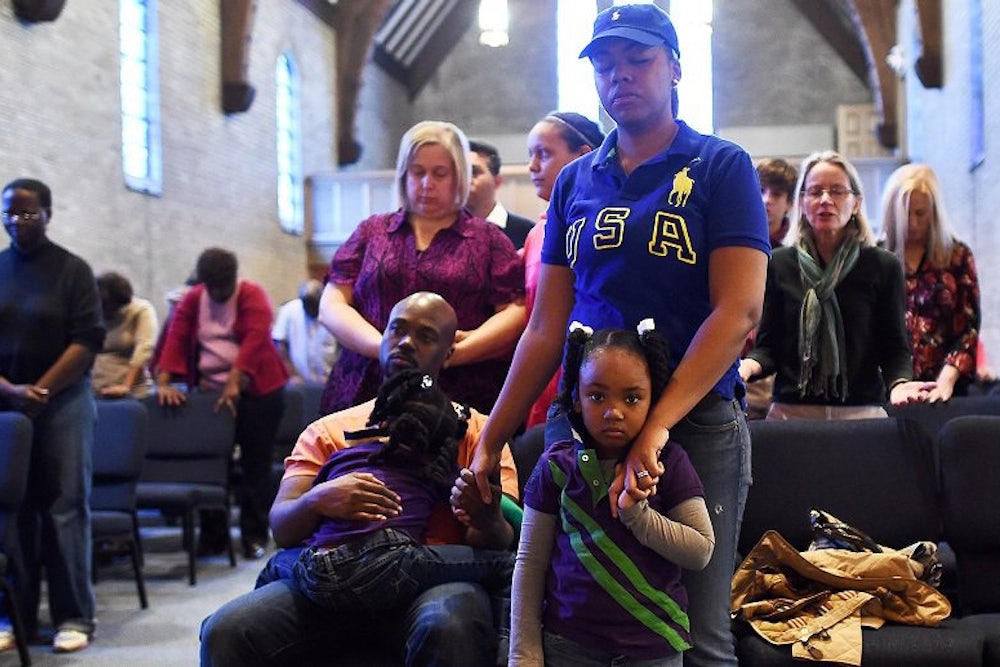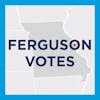
FERGUSON, Mo.—Aeneas Williams began his Easter sermon wearing a “DUKE” baseball cap. Lest we congregants think he was an overzealous fan giving into the sin of pride, the pastor of the Spirit Church had a purpose related to NCAA basketball fervor and was wearing the cap to underscore a simple point to his flock in Ferguson, Missouri: Stop the madness.
Williams reminded the congregation seated in the McCluer South-Berkeley High School auditorium of the oft-ridiculous way in which we accept lies about race, noting that we’re not that far away from the United States being, as he termed it, “majority-minority.”
“Most of us are mixed,” he said. “All this old, crazy stuff. You’re mixed with something! ‘I’m all black’; ‘I’m all white’—the devil is a liar. You got something in you!” The crowd laughed with recognition as the pastor went on to counter some particularly egregious racial stereotypes. “Stop this foolishness and this madness, OK. We’re all crazy, all right? We all have some stuff we’re working on, we’re all under construction. Stop this madness, OK? Stop this madness. Stop this madness. Stop this madness. This stuff is hurting people.”
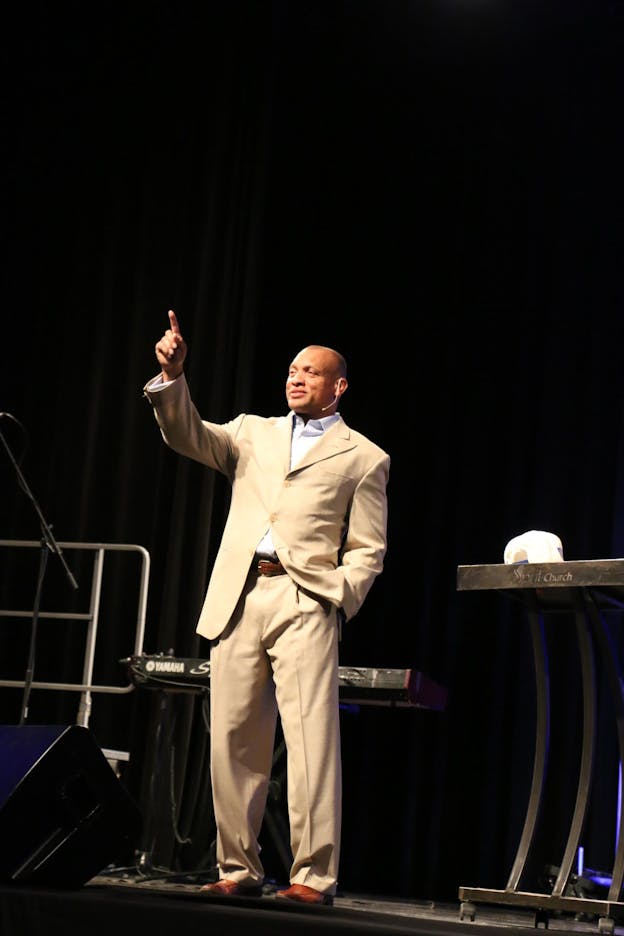
A former NFL defensive back, Williams was enshrined in the Pro Football Hall of Fame one week before last August’s killing of unarmed teen Michael Brown by a Ferguson police officer. As such, he may seem an unlikely person to be leading a ministry in a city that, since that day, has become the racial flashpoint of America. But he reportedly was one of the first people Mayor James Knowles III called after Brown’s death, asking for help healing the North St. Louis County community as anger and sadness swelled into a protest which was met with violent, overcompensatory opposition from law enforcement.
Should these churches be leading and guiding these protests, whether they manifest as a march, as a demonstration—or as a vote? On Tuesday Ferguson will hold its first civic elections since Brown’s death, giving residents a chance to remake their influential City Council, a decision all the more crucial in light of last month's damning Department of Justice report about the local police and courts. This Easter weekend, the question came to the fore of how involved black churches must be, going forward, when it comes to stirring up the pot of protest in Ferguson, and elsewhere.
I first met Williams on Saturday, about 24 hours prior to attending his Easter service, at Wellspring, a church a few blocks from the Ferguson Police headquarters which was hosting a day-long Leadership and Advocacy Seminar. Consultants and experts were speaking to local activists and voters about how to engage effectively in the political process. Sponsored by the Congressional Black Caucus (CBC) Institute and taglined as “Building a New Political Future,” it resembled a Politics 101 crash course for residents of Ferguson and two neighboring North County communities, Florissant and Jennings. Slides displaying outlines for increasing political engagement and social media facility were projected on screens next to a giant wooden cross which hung on the wall behind the Wellspring sanctuary lectern.
“I’m hoping people take away practical tactics that allow them to move their message forward,” said Kansas City-based political consultant Michele Watley, one of the presenters. “We’re sort of at a standstill with that. There’s an awareness at the local, national, and even an international level—but there’s no clear understanding of what the next steps are.”
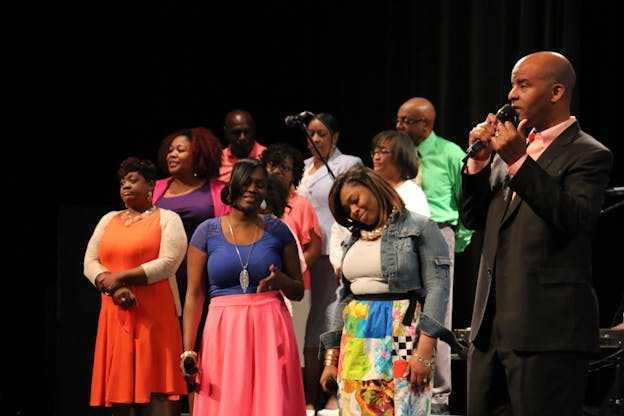
One of the more flippant criticisms of the burgeoning civil rights movement that has risen out of Ferguson has been that the anger did the talking, and that there hasn’t been a tangible political advocacy plan to pair with the consistent protest actions. Whether or not the criticism was unfair seemed irrelevant on Saturday; given the importance of this election in Ferguson, the CBC invested $15,000 and brought along some headliners. Democratic Congressman Keith Ellison of Minnesota gave me the brother-nod as he and I made eye contact at the decimated bagel and coffee table. Lacy Clay, the United States representative for the congressional district that includes Ferguson, was there, as was Rep. Emanuel Cleaver, the former mayor of Kansas City, and chair of the CBC since 2010.
“I think Ferguson is the city that the civil rights movement bypassed,” Cleaver told Williams and I as we sat with him in the office of Pastor F. Willis Johnson. He was lamenting the lack of local transition from church-based civil rights activism to political power that many others, including himself, had experienced. (One could argue that City Council candidates like Bob Hudgins and Lee Smith, whose candidacies rose out of protest and political organization in the wake of Brown’s death, are an example of Ferguson’s belated political maturity.)
Cleaver marveled at how a town that is almost 70 percent black has presently one City Council member of color, and only two total in the city’s 120 years, noting that Ferguson’s corrupt government practices were “taxation by citation” and “strobe-light municipal financing” that disproportionately arrests and bankrupts black people. “You beat on these people and they start becoming more and more submissive,” he said, worrying that if they stayed home Tuesday and didn’t vote (or vote without knowing their candidates), the national sympathy for what their city government has put them through would fade.
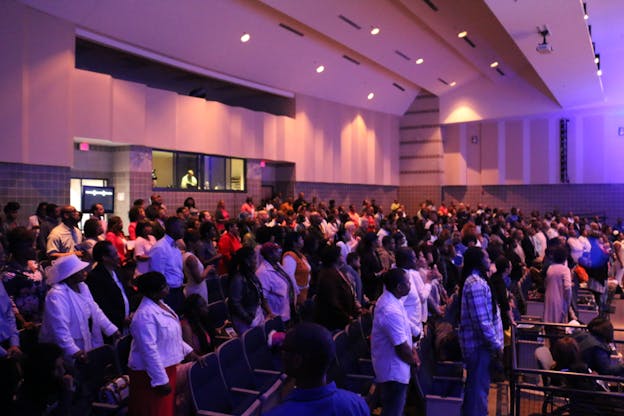
Williams chimed in, pointing out that the black church—more so than any congressman or attorney general—still has the most lasting impact on communities, informing and inspiring the people the elected officials serve. He asked Cleaver for wisdom on this, and for good reason: The congressman is also Reverend Cleaver, ministering a United Methodist church in Kansas City for a generation—even through his mayoralty, and into his stint in Congress—and later, working with troubled churches in Missouri on his weekends.
“It’s not an accident that the civil rights leadership came out of the church,” Cleaver said, citing examples like Martin Luther King Jr., Andrew Young, Adam Clayton Powell Jr., Jesse Jackson, and his own mentors Ralph Abernathy, Fred Shuttlesworth, and C.T. Vivian. “One reason’s real simple, and I used to tell people this in Kansas City: The black pastor is the only one who couldn’t get fired. People are not going to fire you, and white people couldn’t.”
He recalled when as a teenage activist, he led a weekend march that scared a lot of local black residents who had been cowed by oppression, drawing a parallel to Ferguson’s population. By the next weekday morning, warnings had spread throughout his Texas community to quit all that rabble-rousing. “The only people who could stand up and not worry about getting fired were the preachers. Nobody else could say anything. Nobody else.”
That freedom, Cleaver argued, is why the leadership for the movement has to come out of the church, and not from black corporate leaders or Washington politicians, who “cannot agitate and legislate at the same time.” The preacher, said the congressman, can do both. The question in Ferguson and the surrounding area on Easter Sunday, however, was: Is the church doing its utmost to help this new civil rights struggle?
“We pastors have a two-fold role: priestly and prophetic,” Rev. Raphael Warnock told NPR’s Michel Martin in December about the role of the church in the wake of highly publicized police killings of black men last year. “On the priestly side, our job is comfort the afflicted. On the prophetic side, our job is to afflict the comfortable. And the question becomes how can one remain true to both in this moment.”
On Easter Sunday, a group of activists situated themselves in front of several St. Louis area churches to confront that dilemma directly. The group Millennial Activists United (MAU) led demonstrations during Easter services to urge congregations and clergy to action.
“Black Churches across America, as a whole, have been largely silent in supporting the ongoing struggles against racism & systematic oppression,” read the MAU’s pre-released statement. “The time to use your collective voices in service of those without a voice is at hand.”
The statement evoked Jesus’s activist legacy of taking the fight to the streets. “It shall take a combination of both prayer and practice in order to cease the senseless cycles of violence plaguing the Black community & win us our true God given freedom,” it read.
The reception wasn’t always, as you might say, Christian. At the Friendly Temple, a piece of pristine construction that appears like an oasis on a decrepit stretch of St. Louis’s Dr. Martin Luther King Drive, protestor DeRay Mckesson documented on Twitter and Vine the volume of staffers sent out by the church to block the demonstration—as well as the arrival of the police.
“The bishops tried to block our message as much as possible, whether that was pulling two shuttle buses in front of us, or standing in front of us to block our banners and signs,” said MAU co-founder Alexis Templeton. “Eventually, after talking with one of us, the bishops understood our message and went back inside the church.”
“Each church’s response was different, even though our approach at each church was the same,” she added. “At Faith Miracle Temple, the police were called on us. When we arrived at New Cote Brilliante, a minister ended up coming outside to let the congregation who was arriving know that this is God’s work and that ‘It doesn’t get any more peaceful than this.’”
After the protest, Templeton tweeted a reference to Jesus’s words in Matthew 10:34: “Do not suppose that I have come to bring peace to the earth. I did not come to bring peace, but a sword.”
To paraphrase Warnock, the black church is an entity of inherent contradiction, stemming from a religious tradition force-fed to our enslaved ancestors that eventually helped pave a path for black emancipation in generation after generation. Will it do so here, now, in Ferguson? Templeton told me that the protests will morph into canvassing for the City Council elections, and Pastor Williams, through the Adopt-a-Block ministry, continues to canvas as well. He’s reminding people of both the Word and the election.
It will take prayer, protest, and politics to unite at the ballot box Tuesday for Ferguson to see the powerful change it needs.
